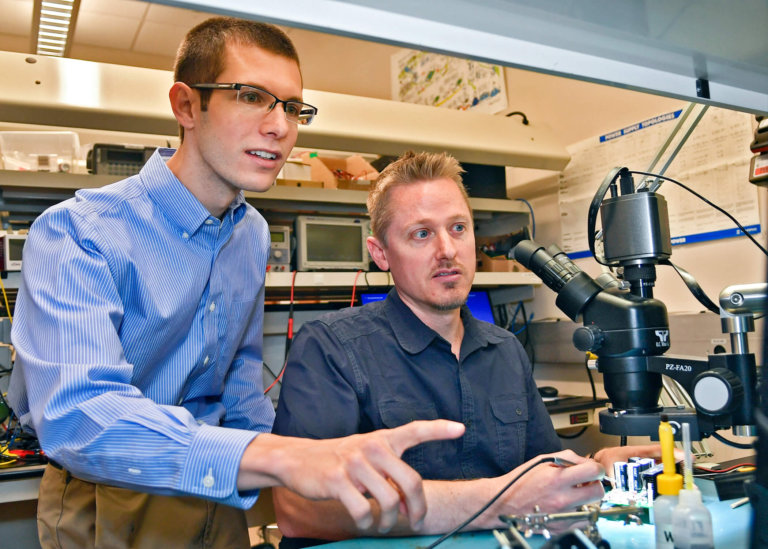
From Tesla’s electricity to Musk’s green vehicles, our world has always been transformed by engineers. Great engineers are revered to the point of becoming icons, yet greater still is the collective contribution of millions of other engineers who fly under the radar. They build robots to assist healthcare procedures. They figure out ways to make solar energy more affordable. They improve the old and optimise the new, so that future infrastructures and systems will be capable of far beyond that which is imaginable today.
These are the professionals entrusted to prepare for the unknown, improving several industries with responsible innovation throughout the world. With their pools of young builders and thinkers, rapidly emerging economies such as India, Nigeria, and Bangladesh could boom in the coming years. Their growing group of scientists from engineering, mathematics, computing, and physics backgrounds play a key role in this agenda.
Whether you’re an ambitious engineer climbing the career ladder or a researcher, fixer, and innovator ready to execute your vision, attending graduate school could hold the key to unlock your next phase. A postgraduate degree in electrical engineering will open up high-opportunity paths to graduates — after all, it’s a chance to further explore specific interests while brushing up on the building blocks of your practice. You could realise your goals at one of these US engineering schools:
THE WILLIAM STATES LEE COLLEGE OF ENGINEERING, UNC CHARLOTTE
With its outstanding faculty, dedicated laboratories, and a diverse community, one of the foremost US engineering schools can be found at the University of North Carolina at Charlotte (UNC Charlotte), North Carolina’s urban research university. Here, the Department of Electrical and Computer Engineering (ECE) offers well-structured postgraduate programs including the Master of Science in Electrical Engineering (MSEE) and the new Master of Science in Computer Engineering (MSCPE) which equip graduate engineers with the skills and smarts to communicate and solve novel problems.

Source: UNC Charlotte – Department of Electrical and Computer Engineering
The MSEE program provides advanced knowledge on the theory and applications of electronics, electrical systems, and signal processing. Focus areas within MSEE include communication systems, controls, signal and image processing, microelectronics, power and energy systems, and others. The MSCPE program prepares graduate students for current and future generation computer hardware and software. From VLSI design to Smart Grid management, students curate their learning by selecting from an extensive list of electives. This MS program begins in the fall 2021 semester, for which applications are currently being accepted. Master’s students may progress to the PhD in Electrical Engineering or dive back into their careers to apply this newly acquired knowledge
As part of a research institution, UNC Charlotte’s ECE comprises a multidisciplinary faculty. They develop machine learning and artificial intelligence, improve communications and networking, and optimize circuits and devices. ECE faculty members — who are heavily involved in select research areas — bring their knowledge into the classroom, building the foundation for engineers of tomorrow. Graduates appreciate the hands-on learning experience they receive at the ECE, which delivers excellent value for money.
WHITING SCHOOL OF ENGINEERING, JOHNS HOPKINS UNIVERSITY
Johns Hopkins has a 100-year legacy in producing engineers with the power and know-how to transform society. Its engineering school is ranked in the US top 20, with electrical engineering being one of the earliest disciplines taught. It continues to champion biomedical applications, quantum electronics, and communications sciences to this day. The department expanded to include computer engineering in the early 80s, furthering discoveries in integrated electronics, imaging and speech processing, and various other facets of information science.

Source: Shutterstock
Graduate engineers pursue the Master of Science in Engineering (MSE), which offers 11 electrical and computer engineering specialisations. Whether they are creating neuromorphic devices or developing new photonic applications, students are immersed in a research-rich environment that nurtures creative ability in tech. They go beyond textbook learning, driven by the curiosity and determination to engineer better, stronger systems.
Plus, the Whiting School has recently invested in training and tech to optimise the learning experience during the pandemic. Its faculty is heavily involved in the industry; they are executive-level scientists and engineers perfectly positioned to guide the builders of tomorrow.
VITERBI SCHOOL OF ENGINEERING, UNIVERSITY OF SOUTHERN CALIFORNIA
USC’s Department of Electrical and Computer Engineering — known as the Ming Hsieh Institute — houses one of the largest Master of Science programmes among US engineering schools. Graduate students choose from a wide range of programmes including Computer Architecture, Wireless Networks, Quantum Information Science, and Green Technologies, honing their expertise to positively influence data transmission applications. The system division alone covers the study of communications, control, and signal processing, exhibiting the wide breadth of research areas to explore here.

Source: Shutterstock
It’s no wonder interdisciplinary research is prioritised in this school. Electrical engineering graduate students collaborate with doctors and physicists, for example, widening the path for future industry crossovers that could yield greater innovations. With 11 research areas and over 70 centres and labs, this is one of the best places to kickstart those collaborations. Now, if you consider yourself a leader of the pack, you may even consider the Masters Student Honours Programme, which opens up greater opportunities to network and qualify for fellowship or funding.
On top of these advantages, graduate students are also privy to a leading distance learning programme called DEN@Viterbi. This enables international students to complete coursework, consult with faculty, and learn from each other as if they were on campus.
COLLEGE OF ENGINEERING, MICHIGAN TECHNOLOGICAL UNIVERSITY
Michigan Tech’s MS Electrical and Computer Engineering (MSECE) is unique in the sense that it allows graduate students to pursue emerging pathways that meet their career goals. It offers a flexible mix of coursework from several sciences, converging electrical and computer engineering — as well as hardware and software systems and applications — for ideas yet to be imagined.

Source: Shutterstock
Choose from thesis, report, or coursework structures; the coursework option even offers two focus areas for online master’s, namely power systems, or signals and systems. A focus on power systems beckons you to explore smarter management and control of energy, for example through smart grids and renewable energy. On the other hand, studying signals and systems encourages the advancement of sensors and sensor arrays, with potential impact on communications, robotics, and optics.
The best part? Ambitious engineers can learn these and more completely online while pursuing their careers. Graduates don’t just level up personally and professionally — they become the supervisors, researchers, managers, and visionaries that shape our collective electrical future from their corner of the globe.
*Some of the institutions featured on this article are commercial partners of Study International









